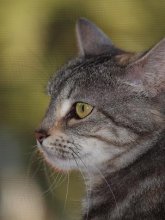Domestic Pets
Our pets are an important part of our lives, but they can also impact on our local wildlife. Cats harm wildlife by hunting and dogs by either catching and killing birds or chasing birds out of yards. Surprisingly there has not been a lot of literature in Australia that examines these potential impacts. In fact, there is no literature that examines the direct impact of dogs at all. However, dog and cat urine has been shown to damage newly planted vegetation and therefore may cause issues for bush regeneration sites as well as domestic gardens. There are some common misconceptions about the cats in particular, and wildlife that have been examined in the scientific literature.
- Myth: Cats are happiest outdoors – Truth: if provided with plenty of stimulation and attention, cats can, and do, live very happily indoors. Ideally a kitten should be raised indoors. However, given enough time to adjust, cats that have spent their entire life outdoors can live happily inside. Cats that are allowed to roam are also more likely to be killed by cars, dogs or by fighting.
- Myth: Bells on collars stop predation – Truth: cats can learn quickly how to move silently with a bell or bells attached.
- Myth: Keeping a cat well fed will stop it from hunting – Truth: there is no evidence to support this, a well fed cat will still hunt.
- Myth: A night time curfew stops predation – Truth: this no doubt stops night time captures, especially of nocturnal animals such as possums and other mammals, and keeps the cat safe from potential dangers. However, birds are usually hunted during the day especially dawn and dusk so it is important that cat curfews include the early morning and evening period.
- Myth: Desexing limits a cats desire to hunt – Truth: desexing does not stop a cat from hunting but it nevertheless should be encouraged. As well as stopping unwanted litters, it also lessens your cat’s likelihood of being injured in a fight.
Here are some tips in order to have a harmonious relationship between your dogs or cats and birds visiting your garden:
- Keep cats indoors and/or create a cat-proof outdoor enclosure –not allowing a cat access to potential prey is the only way to completely stop it hunting. This also keeps the cat safe from potential dangers. Special cat netting placed on fences and walls can also stop the cat escaping from the yard but will not stop it taking prey.
- Provide refuge in the yard for birds and reptiles– create locations in the garden for animals to retreat to that are out of reach of cats and dogs. Chicken wire or otherwise fenced off garden beds can keep pets away from bird habitat.
- Dense natives are good hiding spots for small birds. These should be planted in thickets of several shrubs.
- Nest boxes should be high in trees inaccessible to cats with metal collars placed around the base of trees.
- Bird baths should be beyond the reach of pets – hanging from a tree is ideal. They should have good visibility all around it and a perch nearby so birds can observe the area before using the bath and also be able to retreat quickly
- Prevent neighbouring cats from spending time in the garden - a spray of water from a water bottle is a great deterrent and will not harm the cat.
- Strike up a friendly conversation with your neighbours if you are concerned about cats wandering onto your property and talk about some solutions but if the problem remains, speak to your local council about your options. Some have cat-traps that you can hire (and that won't harm the cat). Remember it is illegal to harm wildlife and domestic pets.









